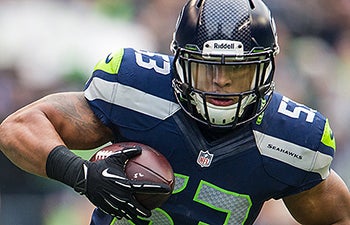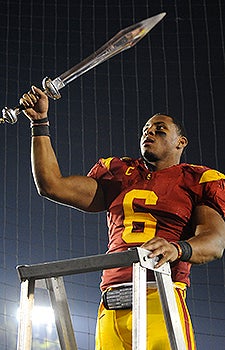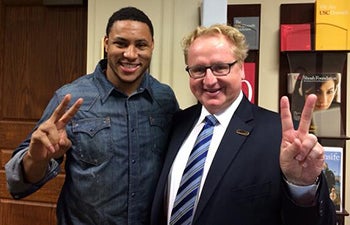Most Valuable Trait
Tenacious. Physical. Nasty.
That’s how Malcolm Smith ’11 describes playing defense.
“It’s not something everybody can do,” he said. “There’s definitely a darker spot inside of you — a vicious attitude — when you’re playing football.”
But talking to the mild-mannered, 24-year-old Seattle Seahawks linebacker, you wouldn’t believe there’s a mean bone in his body.
Then again Smith has always been a fighter. Named Super Bowl XLVIII MVP, he tackled challenge after challenge before taking the stage at MetLife Stadium in East Rutherford, N.J., to accept the trophy on Feb. 2.
Born and raised in Woodland Hills, Calif., a young Smith had a tough act to follow with his brother Steve, four years his senior.
“My brother was already a football ‘phenom’ at 10 years old,” Smith said of Steve, who would become a legendary wide receiver at USC and later for the New York Giants, Philadelphia Eagles and St. Louis Rams.
“I remember my first practice as a six-year-old scrimmaging against another team. I got crushed.”
Smith recalled looking through his helmet at his parents, Steve Sr. and Audrey, on the sidelines.
“My mom’s like, ‘Take him out! Take him out!’ and my dad’s like, ‘Do you want to play?’” Smith said. “And I just said, ‘No, I want to play’ and I went back on the field.”

Seattle Seahawks linebacker Malcolm Smith intercepts a pass by St. Louis Rams quarterback Kellen Clemens and returns it 37 yards for a touchdown on Dec. 29, 2013. Late in the 2013 season, Smith intercepted passes in four of Seattle’s last five games. Photo by Rod Mar/Seattle Seahawks.
After a successful early career as an All-American at Taft High School, that same sense of determination led Smith to attend USC Dornsife beginning in Fall 2007.
“When my time came to be recruited, it came down to Cal, Notre Dame and USC,” he said. “And no place was like USC with its tradition, athletics and academics.”
Initially planning to study civil engineering, Smith found a major in economics was a better fit.
“By majoring in economics, I learned about decision-making,” he said. “I learned how to make thoughtful choices regarding my spending, my time and my friendships.”
Smith acknowledged being a student-athlete at USC was tough. He relied on resources such as tutoring for added support.
“There were other majors I felt wouldn’t push me to my potential,” he said. “But economics was definitely a challenge and it has always been a goal of mine to take that intensity I experience on the field and try to emulate it in the classroom.”
In particular, Smith remembered an economics crisis course for which he had to participate in a group presentation. One of the only student-athletes in the class and a self-proclaimed “terrible public speaker,” he sensed others viewed him as the weak link. He was determined not to let his academic team members down.
“We went through the debate and I made some great points,” Smith said. “The professor encouraged me and pushed me out of my comfort zone. I still remember how that moment in the classroom shifted my mindset and I realized I can do this.”
On the field, Smith spent his freshman and sophomore years with the Trojans as a backup linebacker and on special teams. It was after defeating Penn State in the 2009 Rose Bowl and joining his teammates for a celebratory dinner that he faced his most challenging adversary.
“These guys were crushing the prime rib and I could barely swallow one,” Smith recalled in an interview with Rich Eisen for his NFL Network Podcast. “It just got progressively worse over time and I couldn’t swallow water for a little bit. I started losing weight and I was like, ‘I think there’s something wrong with me.’ ”
After a barrage of tests, doctors diagnosed Smith with a rare disorder of the esophagus known as achalasia, which affects about 1 in 100,000 people. The disease makes it nearly impossible to eat and maintain a nutritious diet; each bite is difficult to swallow and is often followed by regurgitation. The then 19-year-old’s weight dropped from 240 pounds to 205.
Smith feared his football career would be over.
During the 2009 offseason, he underwent a surgical procedure called a myotomy, which helped his condition. After recovery, he trained relentlessly.

As a linebacker for the USC Trojans, Malcolm Smith celebrates a victory over crosstown rival UCLA Bruins in 2010. Photo courtesy of USC Athletics.
In Fall 2009 Smith returned — despite his condition as well as ankle and shoulder injuries — to start in nine games. He made 72 tackles. His college career highlight came when he led the Trojan defense to a 28-7 win over crosstown rival UCLA Bruins. He earned Walter Camp Football Foundation National Defensive Player of the Week and Pac-10 Defensive Player of the Week honors after returning an interception 62 yards for a touchdown.
“I remember thinking this is a big moment for me,” he said. “This is an important time and I want to show the kind of player that I am.”
But not everyone was convinced.
In 2011, Smith was not among the players invited to the NFL Draft Combine and he remained under the radar. That same year, just before graduating from USC, he was selected as the 242nd overall pick in the NFL Draft by the Seattle Seahawks, which reunited him with his former USC head coach Pete Carroll.
Three seasons later with the Seahawks, Smith was positioned as a backup linebacker and special teams player. When he started, he demonstrated he could read offenses by putting himself in the right positions. Late in the 2013 season after taking over for injured teammate K.J. Wright, he intercepted passes in four of Seattle’s last five games.
Then came a critical play after Richard Sherman tipped San Francisco 49ers quarterback Colin Kaepernick’s pass to Smith for an end-zone interception in the National Football Conference (NFC) Championship Game on Jan. 19, 2014. Smith’s interception not only secured the Seahawks’ second Super Bowl appearance, but instantly elevated his profile.
“With all the struggles I’ve had with striving to be a good student and overcoming my health issues and injuries, I remember riding into the Super Bowl thinking, ‘Wow, everything’s come all the way back around for me,’” he said.
During the second quarter of the Super Bowl, Smith once again made a game-clinching play by intercepting Denver Broncos quarterback Peyton Manning’s pass and returning it 69 yards for a touchdown. Later, Smith recovered a fumble by Denver’s Demaryius Thomas.
Smith was named Super Bowl MVP in recognition of his contributions to the Seahawks’ 43-8 victory. He was the first defensive player in more than a decade to win the award and the third linebacker in history to receive the honor.

Following his Super Bowl victory, USC Dornsife alumnus Malcolm Smith returns to the University Park campus on March 5 to meet with USC Dornsife Dean Steve Kay. Photo by Emily Cavalcanti.
Despite the media blitz that followed, Smith has remained grounded.
“It’s not how you start; it’s how you finish,” said Smith in an interview with Sports Illustrated’s Peter King. “Let it humble you; and let it give you fire. You know, I have the 2011 draft bookmarked on my computer. I’d say once a month, at least, I open it up and scroll through and look at all the names, one through 254. I still do now. I just want to see all those picked ahead of me and what happened to them. Winning the Super Bowl validated my progress and validated that I can play.”
Afterward, the MVP deserved a little celebration.
As Smith boarded a plane to Disney World, he shared his experience with his more than 50,000 followers on Twitter: I’m going to Disneyworld!! No literally, I am. #StillInShock. Weeks later, he returned to USC’s University Park campus to meet with USC Dornsife Dean Steve Kay and USC Trojan head football coach Steve Sarkisian.
He told them how his fighting spirit had been nurtured at USC.
Smith also remembered his mother’s unrelenting cheers when he was just a child sweating under his helmet. He gave her his Superbowl MVP Chevy Silverado.
“My mom once told me, ‘You can have whatever you want, you can be whatever you want, you can do whatever you want,’” said Smith, who also has two younger sisters, Breonna and Alexi. “She helped me see there are no limits to what I can accomplish.”